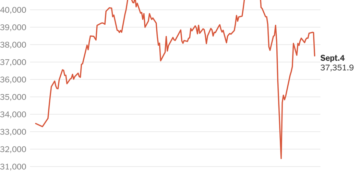Markets remained unsettled on Wednesday as technology stocks continued to fall, dragging down stock indexes across the world for a second consecutive day.
The market tumble that began in the United States on Tuesday continued across Asia and Europe as concerns about the global economy and major tech companies like Nvidia spread among investors.
In the United States, the S&P 500 wavered in early trading on Wednesday, after a steep drop of more than 2 percent the previous day.
Nvidia fell at the open of trading before recovering to trade at a small gain. On Tuesday, the semiconductor giant’s stock plunged nearly 10 percent, erasing some $279 billion in market value, the biggest one-day decline for a U.S. stock on record.
A report released by the Labor Department on Wednesday showed that job openings in the United States fell below expectations in July, to 7.7 million, a decrease from a downwardly revised 7.9 million the previous month. It was another sign of the labor market cooling, a source of anxiety for investors monitoring the health of the U.S. economy.
U.S. Treasury yields fell after the report, as traders bet that the Federal Reserve would announce a potentially bigger interest rate cut than had been expected when officials meet next week.
“The markets may not be as nervous as they were a month ago, but they’re still looking for confirmation the economy isn’t cooling off too much,” Chris Larkin, head of trading and investing at E-Trade, said in a statement. “So far this week, they haven’t gotten it.”
Benchmark indexes in Japan and Taiwan dropped more than 4 percent on Wednesday. South Korea’s Kospi index fell 3 percent and stocks in Shanghai and Shenzen also dipped. Trading in Europe followed a similar pattern, with the Stoxx 600, which tracks shares across the continent, down 1 percent.
Oil prices have also fallen sharply, reflecting broader unease about the global economy. Brent crude, the international benchmark, slipped to its lowest point of the year, at about $72 a barrel on Wednesday.
The reaction in global markets shows that investors are still jittery weeks after the market meltdown in early August, when fears about a slowdown in the U.S. economy snowballed into a global rout.
A series of economic data points since then has eased concerns about a potential recession in the United States, and stocks had rebounded sharply in recent weeks.
That rise ruptured on Tuesday.
The sell-off predominantly affected technology and semiconductor stocks, mirroring the declines seen in major U.S. tech companies such as Nvidia.
The Japanese chip equipment maker Tokyo Electron fell more than 8 percent on Wednesday, while the technology investor SoftBank was down nearly 8 percent. Taiwan Semiconductor Manufacturing Company saw a decline of more than 5 percent. ASML, a Dutch manufacturer of chip-making equipment, fell more than 6 percent.
In a report this week, analysts at the Bank of America said it expected the global economy to grow 3.1 percent this year, a slightly slower pace than it had earlier predicted. The bank said it expected the United States to avoid a recession but took a less positive view of China, downgrading its growth estimate and calling government policies insufficient to stimulate demand.
Investors in the United States and elsewhere are awaiting the U.S. Labor Department’s August jobs report, scheduled for release on Friday.
Anticipation of that report has reignited concerns about a potential slowdown in the U.S. economy. It could also provide clues about how aggressive the Fed will be in its expected interest rate cut later this month.
The post Wall Street Is Unsettled Again, After Fueling a Global Sell-Off appeared first on New York Times.



















